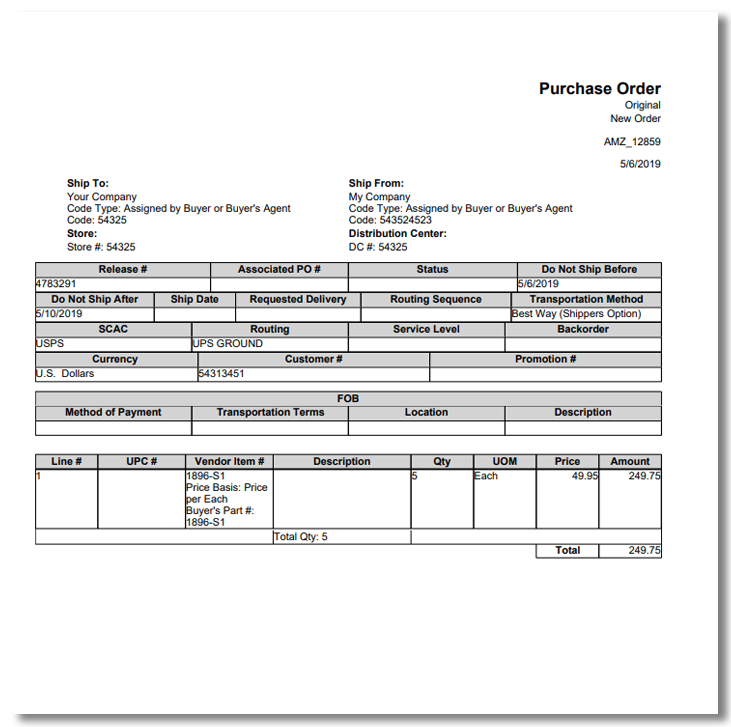The Benefits of EDI Services for Small Businesses

January 5, 2022
Getting an Electronic Data Interchange (EDI) solution for your small business can drastically improve your operation. With it, your business can save time and money, reduce your team’s manual labor, and create better, more streamlined relationships with your trading partners.
The concern is that EDI is usually associated with larger operations, making it difficult for smaller businesses to understand how an EDI solution can benefit them or why one would be worth pursuing. This guide seeks to answer those questions and more, including:
- What is EDI?
- Why do large distributors and retailers often require EDI?
- What are the benefits of EDI?
- How do you manage the challenges of EDI implementation?
What is EDI?
EDI is a system or method of exchanging business documents with trading partners, including your suppliers, customers, carriers, 3PLs, or other supply chain connections. It is an automated solution that replaces snail mail, faxes, and emails as a way of exchanging ingoing and outgoing documents like purchase orders, advance ship notices, and invoices.
The system uses transaction codes to standardize these documents across your business as well as your trading partners. Plus, you can connect your EDI to your ERP (or other systems) to autofill most information that would typically need to be retyped. This means you can streamline your workflows to reach new levels of efficiency for your team.
Why Do Large Distributors and Retailers Often Require EDI?
Some larger trade partners such as Walmart and Target require all their partners to use EDI before doing business— regardless of size. This is a common scenario, and is often seen as a barrier to growth for SMBs.
If it’s a barrier to expanding their product mix, why do retailers make EDI requirements at all? Because EDI enables them to standardize their documents across a huge range of vendors. This ensures that every incoming document has exactly the details which that specific retailer needs for their ERP and internal processes. At the same time, it helps eliminate human errors and streamline tasks in the retail business itself.
The advantages of EDI go beyond the ability to trade with large retailers, and far outweigh the cost and time associated with implementing an EDI solution. One of the most significant benefits is that choosing to buy an EDI solution early on gives your business the ability to save a tremendous amount of cumulative time, effort, cost, and reduce stress as the years go on.
What are the Benefits of EDI?
How do you think standardized automation can benefit your business? Well, what would it mean to process and share invoices or shipping orders quickly? How would your team benefit from not having to retype the same information for every order? Below are a few of the major benefits of investing in EDI, from productivity, to accuracy, to business growth.
https://fast.wistia.com/embed/medias/70e3hntmoy
Increased Productivity and Time for Staff
If you’ve ever done manual data entry, you know how tedious it can be, especially when it comes to retyping the same pieces of information repeatedly. EDI offers more than just “form-filling” capabilities, but that one aspect can make a massive improvement on your team’s morale. Plus, your team will benefit from a reduced risk of errors.
With EDI’s ability to process orders quickly and carry out workflows without intervention, it frees up more time and energy than just the manual data entry component. So now you’ve gone from paying your employees for hours of data entry work to paying them for doing more valuable tasks. This is crucial for smaller business teams whose employees tend to have multiple roles within the organization.
Increased Customer Satisfaction and Loyalty
Another area where small businesses can really stand apart from their larger counterparts is customer satisfaction and loyalty. Smaller businesses are able to hold a special place in their customers’ hearts. By building a consistent, high-quality brand experience throughout every dealing with your business, you create customers who will come back for more and perhaps even share their positive experiences within their social circles.
EDI helps with this by allowing your team to process orders more quickly and seamlessly while reducing shipping errors. It helps ensure you create an experience your customers appreciate, which opens the door to repeat business, word of mouth referrals, positive online reviews, and more sales from your target market.
Increased Speed and Accuracy with Automation
Incorrect orders have a more considerable effect on smaller businesses that have limited staff and a more difficult time absorbing costs than bigger enterprises. Implementing an automated solution reduces human error and prevents issues with orders, thereby keeping up your business reputation.
Without EDI, each partner could potentially have a different method of sharing business documents. This leads to extra manual work and increases the risk of clerical errors, with both factors contributing to higher stress levels and more work for your team.
With EDI, you’re cutting out sporadic, overwhelming emails, faxes, phone calls, and physical pieces of mail. That means you no longer have to worry about tracking the information from these documents. No more having to decipher poor handwriting, proofread excel sheets or deal with company information that the company itself got wrong.
Increased Growth
Implementing EDI early on in your small business will allow you to scale when the time is right. This can improve your initial opportunities when talking to new trading partners, ensure you stay compliant, and allow you to offer a consistent customer experience to perpetuate recurrent sales.
Since most of your order processing tasks will be automated, your staff will be able to handle large influxes of B2B commerce purchases without needing to add additional staff members. As a result, you can serve your customers more easily during peak periods and holidays, maintaining your solid reputation as a fast, reliable shipping partner.
How do You Manage the Challenges of EDI Implementation?
Getting started with EDI is not without its challenges. The implementation process can be intensive, but the good news is that you can partner with a reputable solutions provider to help guide you through the process and even supplement your team, if necessary, during the interim.
Accommodating the new system might be something to which your team has to adapt, but it will quickly prove how it improves productivity and frees up your team’s time on top of its ROI.
The more you can integrate into your EDI, the more effective your system will be, especially with its auto-filling capabilities. A solution like TrueCommerce EDI is designed to be integrated across your various sales channels and solutions to ensure you get the greatest functionality. And if you do need help integrating EDI with your other platforms, we have highly experienced teams trained to overcome any challenges, technical or otherwise.
Invest in EDI for Your Small Business Today
Hopefully, this guide has answered a lot of your preliminary questions about the benefits of EDI. But there’s always more to learn, and you may have come up with a few questions on your own. If you’re interested in implementing or learning more about how EDI can help your small business, please reach out to us today. You can also dive deeper into the EDI buying process by reading our complete EDI Buyer’s Guide!
About the Author: Lindsay Renner is Manager of Customer Success at TrueCommerce and is an EDI, integrations (including Microsoft flat files), customer success, and customer experience expert with over a decade of EDI experience and nearly 7 years at TrueCommerce. Lindsay developed and oversees our Customer Success programs for TC core products and B2BGateway in North America. She lives in Columbus, OH, with her husband and two young sons. In her free time, she likes to volunteer with local non-profits, adventure outdoors with her family, and plan/book domestic and international vacations (bonus if snowboarding or whiskey is involved!).
Share this post:
Stay ahead of the competition
Get expert supply chain insights delivered directly to your inbox weekly.

